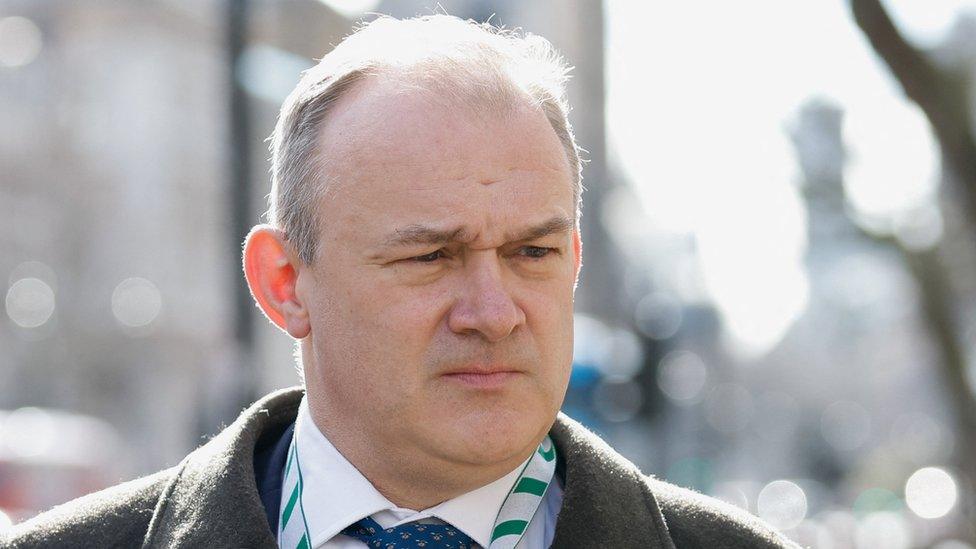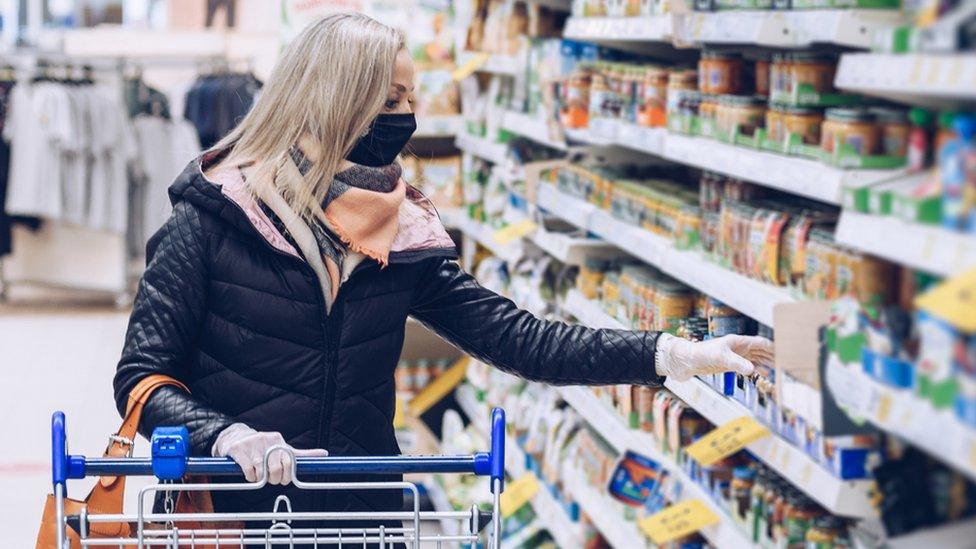Rishi Sunak must cut VAT to tackle cost-of-living rise, say Lib Dems
- Published

Lib Dem leader Sir Ed Davey made the call as the party's online spring conference got under way
The Liberal Democrats have urged Chancellor Rishi Sunak to cut VAT from 20% to 17.5% for a year to help households cope with soaring bills.
Leader Sir Ed Davey said this would save families £600 on average and enable the High Street to keep going by relieving the squeeze on consumers.
Inflation is expected to pass 7% soon, with food and energy costs, council tax and National Insurance all rising.
A Treasury spokesperson said: "We keep all taxes under review."
Official figures suggest cutting VAT by 2.5 percentage points would cost the state just over £18bn a year in revenue.
The government has already ruled out reducing VAT on energy bills and a source told the BBC it would be "very difficult" politically to reverse this decision.
The Resolution Foundation think tank warned this week that UK households faced the biggest real-terms fall in income since the mid-1970s, leaving the typical household £1,000 worse off.
The Bank of England says inflation is expected to hit 7.25% next month, while the Institute for Fiscal Studies (IFS) predicts it could pass 8% later in the year.
The Lib Dems, who are holding their online spring conference this weekend, want Mr Sunak to use his Spring Statement on 23 March to cut VAT.

Food prices are rising, as household budgets face challenges on several fronts
They are also calling on him to scrap the 1.25 pence in the pound rise in National Insurance, due to come in on 1 April - which the government says will help deal with NHS backlogs caused by the pandemic and later go towards funding social care.
Sir Ed said: "This is crunch time for the Conservatives and the chancellor. Their cost-of-living crisis is hitting families hard and it is about to get worse."
Price caps for energy bills will rise in April, costing the average household an extra £693 - or 54% - a year.
Council tax is also going to increase in many areas, while petrol prices, affected by Russia's invasion of Ukraine, have reached a record high.

As a minor presence in parliament, the Liberal Democrats must make the most of every chance they get to gain attention.
This proposed VAT cut is designed to show the party has a plan to ease the financial squeeze being felt by households across Britain.
But look out for more from the Lib Dems' Spring conference this weekend about their priorities elsewhere.
The party will adopt a policy for the UK, in the long term, to join the European single market.
There is hope that as the dust settles after Brexit arguments can at least be made and heard for closer ties to the EU in future.
And then there's the talk of a pact with Labour at the next election, external.
While neither party would put it in those terms, there are not-so-subtle signals being sent that it's in both their interests to step back in certain areas where the other has the best chance of unseating a Conservative MP.

"An emergency cut to VAT is desperately needed for the millions of people around the country worried about making ends meet," Sir Ed said.
"High Street businesses that fear going to the wall would receive critical support, as people who are feeling the pinch spend more at their local shops, cafes and restaurants."
Labour also wants the government to scrap the National Insurance increase and impose a one-off windfall tax on oil and gas producers' profits.
"The Tories have let the cost-of-living crisis spiral... and now they're going to make it worse by hitting working people and businesses with a tax hike at the worst possible time," said shadow Treasury minister Pat McFadden.
The Treasury said that, by freezing fuel duty for the 12th year in a row, it was saving drivers around £15 every time they filled up their tank.
"We're providing over £20bn this financial year and next to help families, which also includes cutting the Universal Credit taper rate, freezing alcohol duty, and helping households with their energy bills through our £9.1bn Energy Bills Rebate," a spokesperson added.